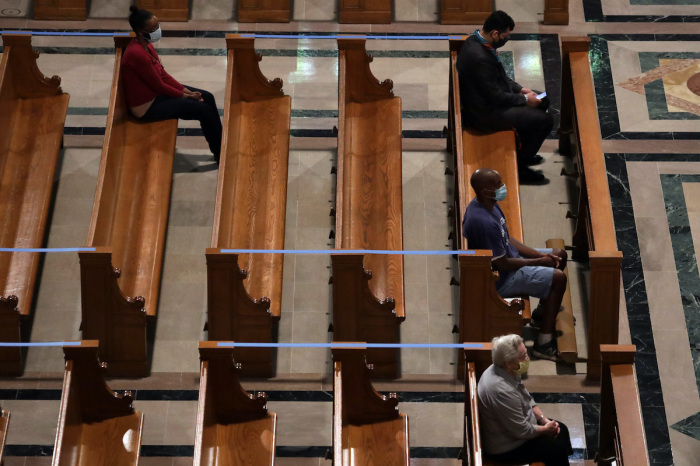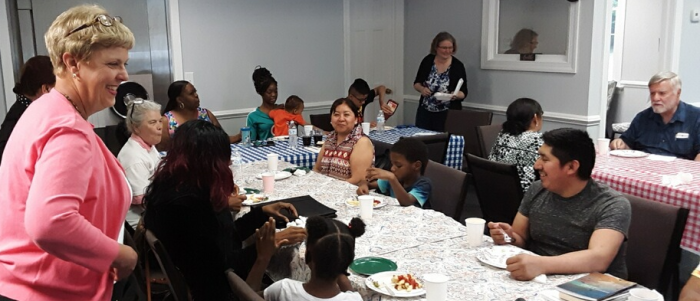Dinner Churches and how the coronavirus is shaking up the traditional model (part 2)

What is the future of the post-COVID Christian church?
If you ask two men involved with the Fresh Expressions movement, it may be taking place on a different night of the week and not Sunday and it may happen over dinner. And more broadly, many longtime American churchgoers are going to have to reconsider how they do church, particularly regarding reaching secularized people.
Harry Zeiders, an Anglican priest now based in Emporia, Virginia, who previously spent time ministering in Northern Ireland, decided to commit much of his life to what is known as "Dinner Church," an initiative of Fresh Expressions.
One of the things that was ringing in his ears was what his bishop from Ireland said — that the Anglican church used to be the church of the working class, but over the years it had been lost and it needed to be reclaimed. Zeiders admitted he did not know what to do about that specifically for the first year or two in a working class community in southern Virginia.
He was running the Alpha course — a 10-week basic Christianity course centered around a meal and dialogue that was developed out of Holy Trinity-Brompton Anglican church in London — in a local diner. It was going well but he ran into the classic question many churches face when they finish Alpha: What should we do next?
"Alpha frames itself as the front porch to get people into your living room. The problem with most churches is that our living rooms look nothing like the front porch and while people who are not churched or they are dechurched, or are 'nones' or ‘dones,' they might feel comfortable enough to hang out on your front porch but when they venture into your living room, the few who are willing to do that, they find that this is really not for them," he said in a recent phone interview with The Christian Post.
"It's not their culture, it's not as hospitable as Alpha oftentimes is. It's not as informative and helpful as Alpha and people act differently in their living rooms than they do on their front porch."
What are known as "nones" are those who have no particular religious affiliation. "Dones" are those who are burned out on or "done" with church.
Zeiders, 49, happened upon the Fresh Expressions program called Dinner Church and was so impressed with it, he had to give it a try. He launched it in the spring of 2019 and almost immediately it was "a great hit."
Asked if he believes that Dinner Church and other Fresh Expressions of the church will be a mainstay of the church in a post-COVID world, Zeiders explained that though where he is serving is considered part of the Bible Belt, it's actually a "burnt over district." He defined that as an area where waves of revival and awakening have manifested historically but then have sunk into valleys of being a dechurched culture, people getting fed up with church and getting burned out.
Though the town of Emporia has approximately 5,000 people, there are over 100 churches, most of which are dead or are dying, he said. The older generation still attends church but their children and their grandchildren are very much "nones and dones."
In such a milieu, the appeal on a nontraditional church has considerable sway, he said.

Zeiders’ Dinner Church meets on a Wednesday night, not a Sunday morning. They advertise that a community dinner is going on. Some will come through the door because of a free meal. Dinner Churches are not typically held in church buildings but in community centers located in neighborhoods that are needy and hurting.
In Emporia, they meet in a small, red-brick bank building complete with a drive-thru bank teller window.
A typical Dinner Church in Emporia begins with ESL class at 6 p.m., maybe a dozen or so Latinos will come. The Dinner Church itself begins around 6:30. The lowest numbers they have ever run is 24; they've had as many as 43. Those numbers may not seem impressive, but to scale they represent one half of a percent to one percent of their entire town.
Zeiders' Sunday morning congregation is anywhere from 12 to 21 people. On Dinner Church nights, they are doubling their numbers.
Zeiders will do what he calls an "agape meal" that resembles communion and he will explain what Jesus did and what it means and invite participants to partake. They then move into prayer with the Lord's Prayer, a Scripture reading, and then a short talk about Jesus. The talks usually center on stories about Jesus or stories that Jesus told. His team then offers prayer ministry for those who want to be prayed for.
"The appeal is that it doesn't feel like most of our churches operate on a Sunday morning. It feels like this is a group of people who say, 'Hey, let's break bread together and sit down together and share these mealtimes, share God's Word together, pray together, and do some work together.' And that's all it is," he explained.
"We're not there to serve a denomination or even a liturgy. We're not there for any other ulterior purpose but to simply be present with one another and be present with Jesus. And I think the simplicity of it can and does appeal to virtually everyone who comes through the door," he said.
Lessons from Northern Ireland
When Zeiders left the States in 2013 to do ministry in Northern Ireland, he thought that the form of low church, evangelical, charismatic Anglicanism that he knew while living in northern Virginia outside D.C. was very vibrant and strong.
Yet when he got to Belfast, the context in which he served was two churches in one parish. One was housed in a beautiful Gothic structure, choristers wore robes and did processions, and it was "as high church as they get in Northern Ireland." On a good Sunday, they'd have 100 join the service. Of those 100, a dozen to 20 might be children.
The other church down the street where he served was a new building, worship featured a contemporary praise band, no one wore vestments and there was no procession. It was a quintessential low church evangelical congregation in Northern Ireland. On a good Sunday, there would be 300 in attendance and as many as 90 children.
"That parish proved to be a microcosm of the whole island. The churches that were stuck in the traditions in the past generations, they were the ones that were dead and dying. And the ones that were willing to be incarnational, they were vibrant and growing," he said.
Church recontextualized
When he returned to the States, he became convinced that while he loved Anglicanism, it had to take a back seat to God's larger mission.
"The way of the future here was, like what I saw in Ireland, was being willing to contemporize our forms of worship and realize as any good missiologist or anthropologist would tell you, to realize that there is a difference between form and meaning," he said.
You can change the forms without changing the meaning, and if you're going to have any chance of reaching new people you almost have to change the forms in order for them to grasp what the meaning is."
The church must incarnate in a way that reaches the most people, he stressed.
Speaking to the contention among some that the younger generation is desiring more ancient rituals and high church liturgy, Zeiders believes it is out of sync.
"To give people an aesthetic of worship that is so removed from their Monday through Saturday is not doing them any good service. It's teaching them that in order to connect with God, in order to grow as a Christ follower, you need to pretend that you don't live in 2020 anymore. And I don't think that kind of formation as disciples is going to have lifelong transformation," he said.
"Dinner Church is net-fishing. It's not an ecclesiology of grandeur. And so churches that want nice things and for everything to look and feel right, Dinner Church would drive them batty. But if churches are willing to roll their sleeves up and get messy and get down in the dirt with the lowest of the low, then Dinner Church is for them."
What this particular expression of church has helped him see is how the church needs to recapture what it means to be the center of the community.
"The vision I've got is not that we would multiply Dinner Churches around the U.S. and North America and the world but that we would multiply community centers instead of planting churches. What I see is a group of Christians who want to plant a church; what they need to do is they should build or find a place where they want to minister and have a facility where they not only hold worship meetings but they also hold Dinner Church and prayer ministry and counseling."
But for this vision to take off among Christian leaders, many will have to reconsider how they conceive of church not theologically but sociologically.
Verlon Fosner explained in a recent phone interview with The Christian Post that one of the things that is happening amid the chaos in the culture is increased prayer and attunement and attentiveness to the voice of God.
Fosner is the Dinner Church Collective director, a stream inside of the Fresh Expressions movement, a movement for people who don't do church, that is, a church with a sociology of church that jives with them even as more traditional Christians do not particularly care for it. He is also the pastor of Community Dinners, based out of Westminster Community Church in the heart of Seattle. Today, they have 13 different locations.
"We've been in a season of comfort-based Christianity, which turns cancerous in a lot of cases," Fosner told CP.
His own church faced this reality 14 years ago, that they had this spiritual cancer of a consumerist variety. The entire church came on Sunday expecting to see a great show, were fine to leave a little money in the plate and then come back next week to do it all over again.
"That's cancer, full-on cancer," he reiterated, "because church is supposed to be a missional expression of Christ in their community, their neighborhood and in their city. Anything shy of that is different from the Christianity that Christ laid out."



























